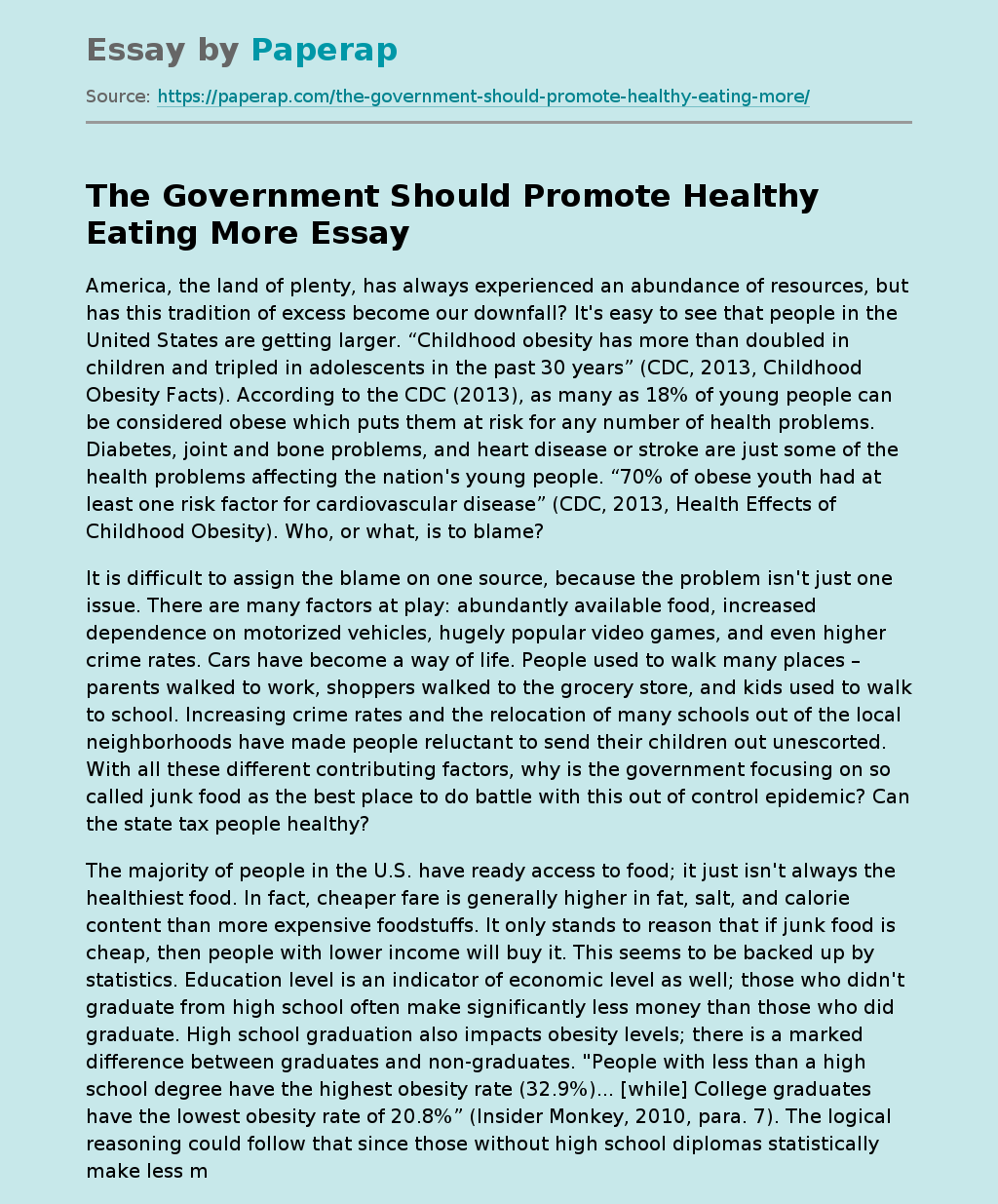The Government Should Promote Healthy Eating More
America, the land of plenty, has always experienced an abundance of resources, but has this tradition of excess become our downfall? It’s easy to see that people in the United States are getting larger. “Childhood obesity has more than doubled in children and tripled in adolescents in the past 30 years” (CDC, 2013, Childhood Obesity Facts). According to the CDC (2013), as many as 18% of young people can be considered obese which puts them at risk for any number of health problems. Diabetes, joint and bone problems, and heart disease or stroke are just some of the health problems affecting the nation’s young people.
“70% of obese youth had at least one risk factor for cardiovascular disease” (CDC, 2013, Health Effects of Childhood Obesity). Who, or what, is to blame?
It is difficult to assign the blame on one source, because the problem isn’t just one issue. There are many factors at play: abundantly available food, increased dependence on motorized vehicles, hugely popular video games, and even higher crime rates.
Cars have become a way of life. People used to walk many places – parents walked to work, shoppers walked to the grocery store, and kids used to walk to school. Increasing crime rates and the relocation of many schools out of the local neighborhoods have made people reluctant to send their children out unescorted. With all these different contributing factors, why is the government focusing on so called junk food as the best place to do battle with this out of control epidemic? Can the state tax people healthy?
The majority of people in the U.
S. have ready access to food; it just isn’t always the healthiest food. In fact, cheaper fare is generally higher in fat, salt, and calorie content than more expensive foodstuffs. It only stands to reason that if junk food is cheap, then people with lower income will buy it. This seems to be backed up by statistics. Education level is an indicator of economic level as well; those who didn’t graduate from high school often make significantly less money than those who did graduate. High school graduation also impacts obesity levels; there is a marked difference between graduates and non-graduates. “People with less than a high school degree have the highest obesity rate (32.9%)… [while] College graduates have the lowest obesity rate of 20.8%” (Insider Monkey, 2010, para. 7). The logical reasoning could follow that since those without high school diplomas statistically make less money, that they would buy cheaper food. And if their obesity rates are also higher, then it could be that the cheap food is making them fat. But does it stand to reason that making that cheap food more expensive would make people with limited income change their shopping habits?
Some people who are in favor of taxing junk food are also often in favor of subsidizing healthy foods like fruits and vegetables. By providing growers with a portion of their income, the government could help these healthy foods to cost less. This actually seems to be more reasonable. If a person is on a limited income and is looking for a bargain, it makes sense to lower costs instead of raising them. A study in New Zealand “found that decreasing the price of fruits and vegetables by 10% increased consumption 2% to 8%” (Scott-Thomas, 2012, para. 5). Perhaps America, too, should look at making healthy food easier to obtain rather than raising prices for poorer people.
The Government Should Promote Healthy Eating More. (2021, Dec 15). Retrieved from https://paperap.com/the-government-should-promote-healthy-eating-more/

